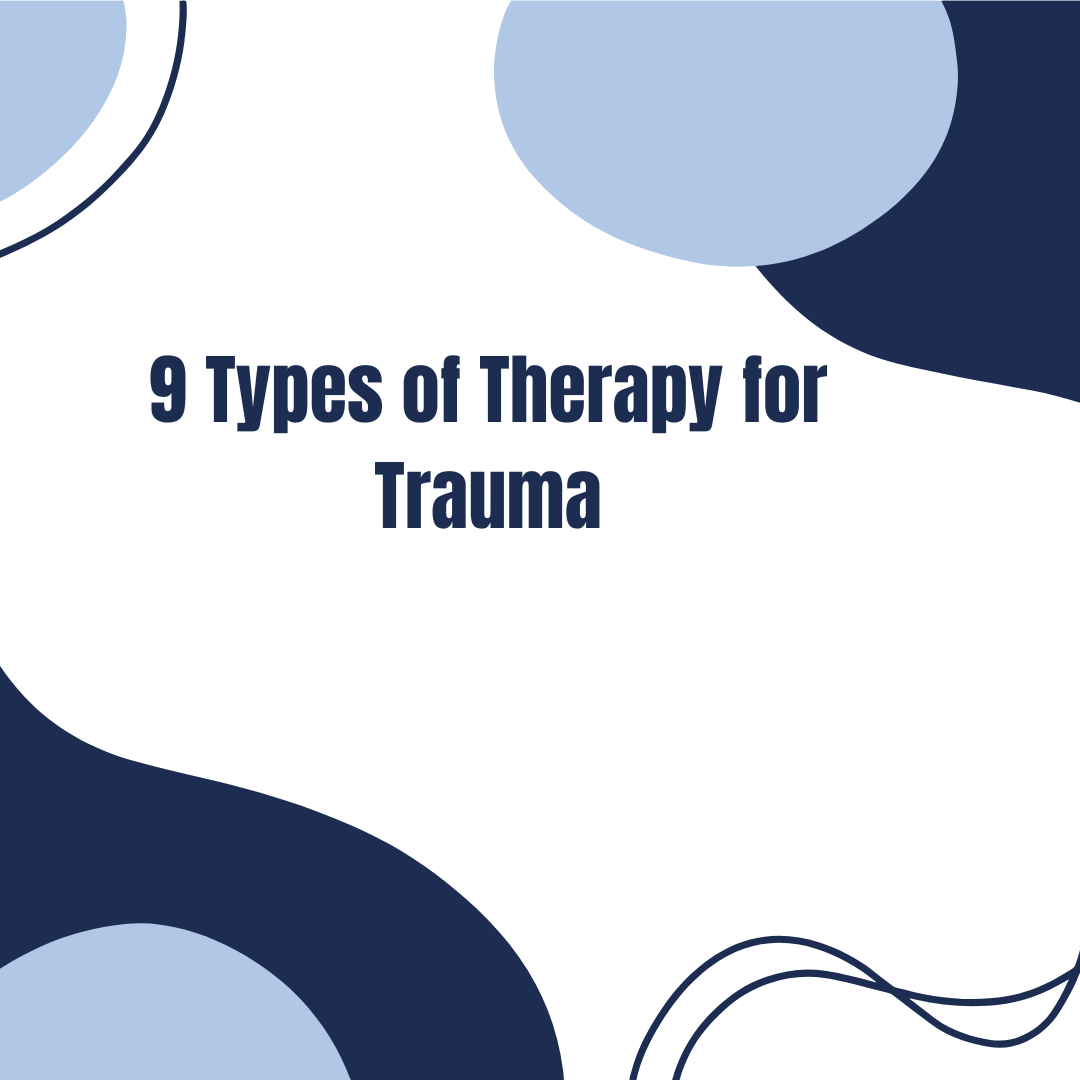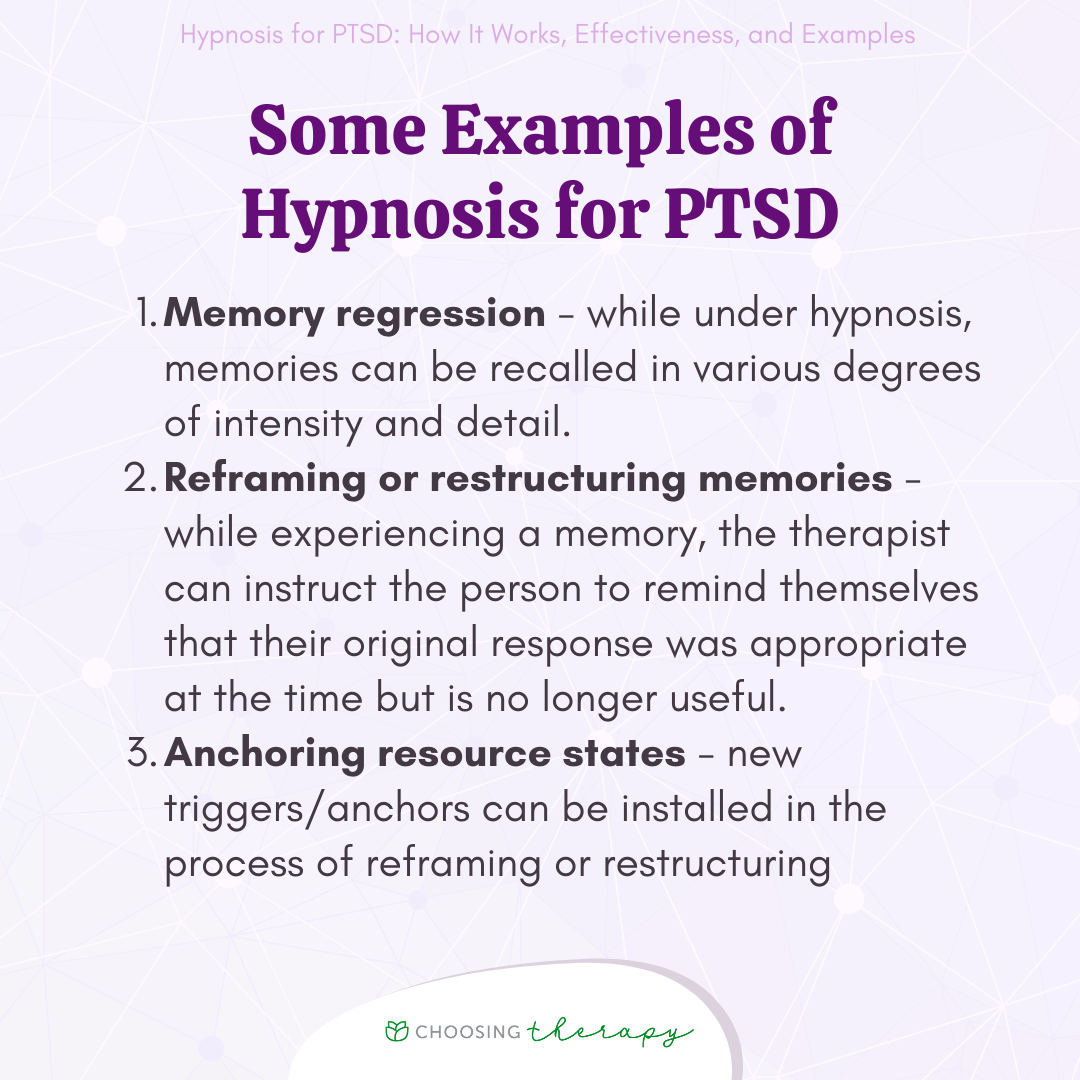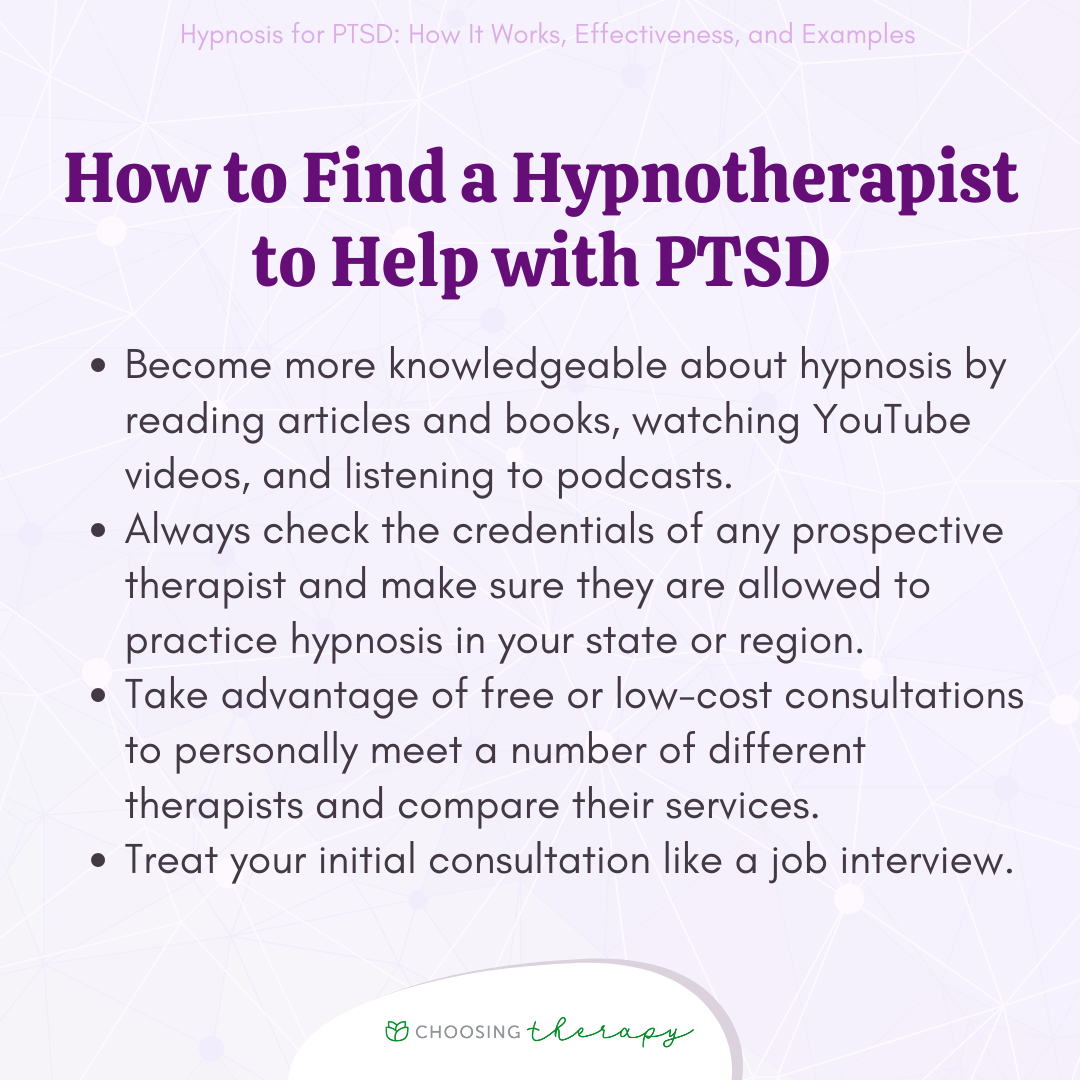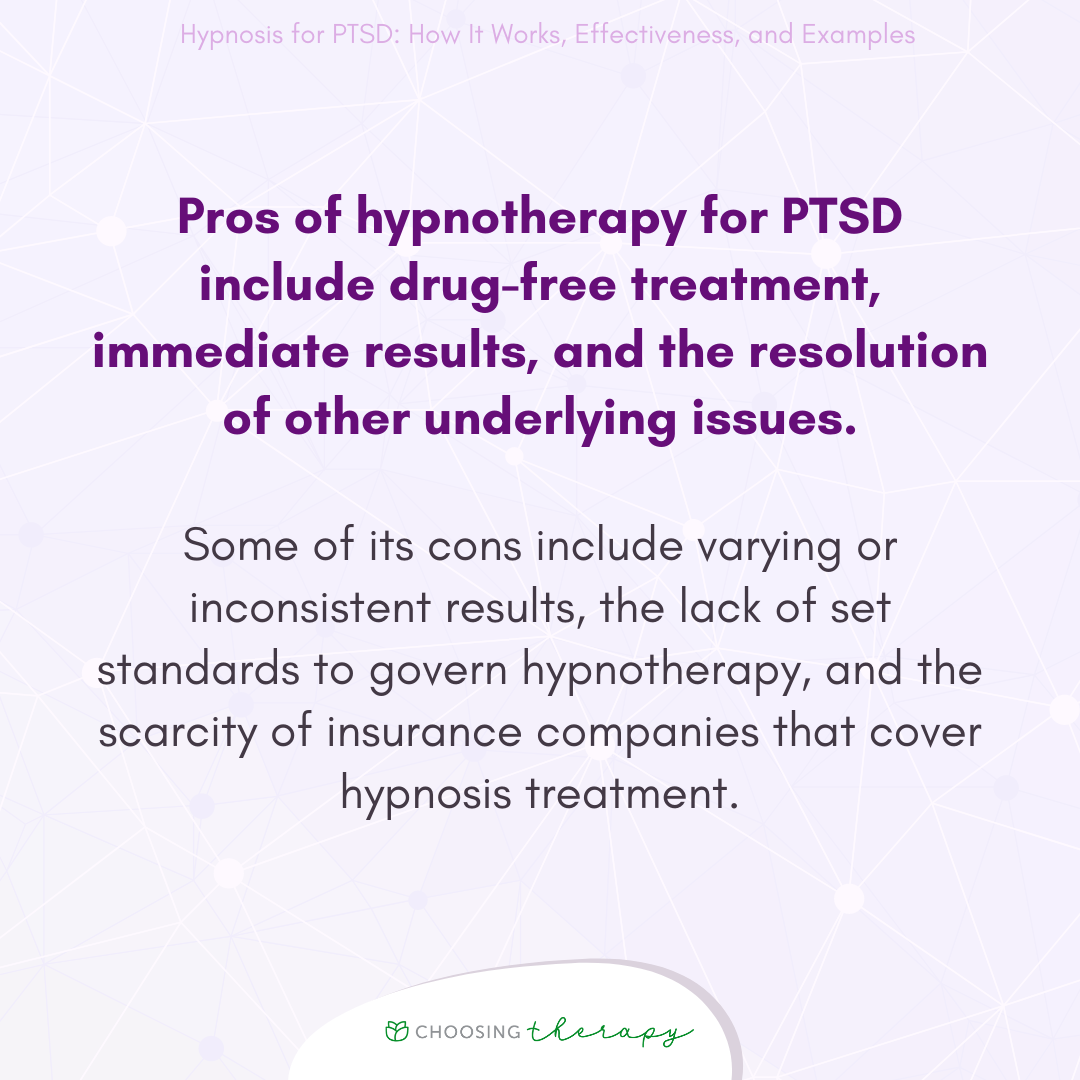Hypnosis for PTSD can help individuals with PTSD cope with past traumas affecting their ability to function and maintain healthy lives. Hypnotherapy and aversion therapy may allow those with PTSD to identify triggers that cause or exacerbate symptoms, permitting them to address these underlying traumas.
Online Therapy For PTSD Therapy can help you live a better life. BetterHelp provides convenient and affordable online therapy, starting at $65 per week. Take a Free Online Assessment and get matched with the right therapist for you!
How Does Hypnosis Work?
Hypnotherapy relies heavily on a model of the mind that includes conscious and subconscious aspects.1 These two parts of the mind have different functions and work together to help people navigate day-to-day life. The subconscious mind contains our memories, beliefs, habitual patterns, and past learnings (i.e., how to tie your shoes, ride a bicycle, or speak a foreign language). In the case of post-traumatic stress disorder (PTSD), the memory of a traumatic event can get “stuck” in the subconscious, resulting in adverse reactions whenever an external stimulus reminds the person of the original trauma.
How Does Hypnosis for PTSD Work?
Because PTSD is deeply connected with subconscious phenomena, hypnotherapy can be an effective solution for people suffering from the effects of past trauma.2 PTSD symptoms range from mild to severe and can persist for months or even years after the traumatic experience. PTSD can result in a severely reduced quality of life and contribute to higher rates of addiction and suicide in some cases.3
In hypnosis, when the subconscious mind is more active and accessible, the hypnotherapist can help the person resolve the traumatic memories and experiences that have become problematic. Adverse reactions and behaviors can be reprogrammed through relaxation, guided imagery, positive hypnotic suggestions, and other methods.
Again, because PTSD can be a complicated condition, various health professionals should be consulted when deciding on the best course of treatment. Different therapies, including EMDR and CBT, can be used alongside hypnotherapy when treating this condition.4
How Can Hypnotherapy Help Someone With PTSD?
Most people will experience a traumatic event at some point in their lives. The brain’s natural response to a dangerous or life-threatening situation is known as the “fight, flight, freeze” response. During a crisis, the amygdala alerts the hypothalamus to release stress hormones that cause the sympathetic nervous system to react appropriately. Once the danger has passed, the brain stops producing those stress hormones and returns to normal functioning.
With PTSD, however, a person has not addressed the traumatic event, disrupting the brain’s natural process. When situations arise in the future that reminds a person of the original trauma, the “fight, flight, freeze” response can be triggered unnecessarily. With its emphasis on physical and mental relaxation, hypnotherapy can be a highly effective intervention for PTSD.
Many hypnotherapists will suggest various self-management tools to deal with PTSD symptoms as they come up in the future. These can include instructions for self-hypnosis, deep breathing exercises, and self-guided relaxation meditations.
Hypnotherapeutic techniques for PTSD include:
- Relaxation: The therapist will guide the person through progressive attention to each body part to achieve sufficient peace and relaxation. Mental and physical relaxation can be a natural antidote to many PTSD symptoms. When the intensity of symptoms is reduced, it is easier to begin meaningful therapeutic work.
- Identifying triggers: Symptoms of PTSD can be triggered by non-threatening stimuli. For example, many combat veterans experience severe reactions to the sound of fireworks or backfiring motor vehicles. While in the relaxed state of hypnosis, it is often easier to identify common triggers that may have previously gone unnoticed.
- Aversion therapy: In the trance state, a person can vividly imagine experiencing triggering stimuli and safely practice more appropriate reactions. With repeated attempts, the severity of the adverse reactions decreases until triggers are no longer perceived as threats.
Help For Trauma / PTSD Talk Therapy – Get help recovering from trauma from a licensed therapist. Betterhelp offers online therapy starting at $60 per week. Free Assessment Online PTSD treatment – Talkiatry offers personalized care from psychiatrists who listen and take insurance. Get matched with a specialist in just 15 minutes. Take our assessment
Example of Hypnosis for PTSD
PTSD is not always the original presenting issue when a person initially seeks hypnotherapy treatment. Co-occurring disorders such as depression, panic attacks, sleep disorders, low self-esteem, and addiction are often associated with PTSD. As these issues are addressed in hypnosis, it is common for traumatic memories to come up. A skilled hypnotherapist will recognize the relationship of these memories to the problem behaviors and symptoms. The therapist will then guide the person toward a healthy resolution. Some examples of hypnotherapeutic techniques include memory regression, reframing/restructuring memories, and anchoring resource states.
Memory Regression
One of the most common tools available in hypnotherapy is memory regression*. While under hypnosis, memories can be recalled in various degrees of intensity and detail. In a full memory regression, a person may re-experience the original event as if it were actually occurring.
This experience can include intense recollections of the event and the person’s emotional state. The therapist will create the conditions for “dual awareness” by reminding the client that although the memory seems quite real, they are in the present moment and free from danger. This allows the person to work with the memory therapeutically without repressing or dissociating from it.
*It should be noted that memory regression should only be performed with an experienced hypnotist or hypnotherapist.
Reframing/Restructuring Memories
Fear responses can be modified once a traumatic memory is accessed in regression, possibly by reframing and restructuring the traumatic memory by allowing the person to bring new resources to the original event.
For example, while experiencing a memory, the therapist can instruct the person to remind themselves that their original response was appropriate at the time but is no longer necessary. The therapist may remind clients they survived the traumatic event and are no longer in danger.
Through guided imagery, it is also possible to have the person reenact the experience with resources and abilities they may not have had at the time of the trauma. For example, a client who experienced abuse as a child can imagine being there as an adult to offer themselves protection and support. The original trauma responses can be neutralized when the client experiences the memory in a new, empowered way.
Anchoring Resource States
Once some progress has been made toward reframing the old emotional/behavioral responses to traumatic triggers, new triggers (also known as “anchors”) can be installed to help the person deal with PTSD symptoms in the future.
First, the person will be asked to generate an empowered resource state, such as feeling safe or competent, while under hypnosis. This state should be experienced with as much detail as possible. Once a sufficient feeling is built up, the person is instructed to create an anchor for these feelings, like touching the forefinger and thumb together. This effectively connects the feeling state with a physical stimulus. In the future, it is then possible for a person to re-experience the resource state by employing the anchor.
Is Hypnotherapy Effective for PTSD?
Hypnotherapy has proven to be highly effective for PTSD alone or as part of a larger treatment plan. One study exploring the efficacy of hypnosis on children affected by PTSD showed that participating children who received hypnosis treatment reported a 77% improvement rate of symptoms after one year.5 More recent meta-analyses found that hypnosis had short and long-term success in alleviating PTSD symptoms.6 Hypnosis for PTSD can also help victims of sexual abuse and veterans recover from traumatic experiences.7,8
How to Find a Hypnotherapist to Help You With PTSD
Always check a provider’s credentials, certifications, and hypnosis training. Consider using free or low-cost consultations to meet several therapists and compare their services. Pay attention to how you feel about the person throughout your conversation, and treat your initial consultation like a job interview. Ask them about their experience with helping people with PTSD. You may also use an online therapist directory to locate a provider or ask local resources for recommendations and referrals.
Pros & Cons of Hypnotherapy for PTSD
As with any therapy, there are pros and cons to treating PTSD with hypnosis. Some pros include a lack of side effects, the immediacy of relief, and the ability to resolve underlying issues. Cons include varying results, lack of national standards, and the likelihood of paying out of pocket.
Pros of hypnotherapy for PTSD include:
- Drug-free: Although drug therapies are common for treating PTSD symptoms, the risk of adverse side effects is likely. Hypnosis relies on expanding a natural state of mental and physical relaxation, and side effects are rare.9
- Immediate results: People can often find immediate relief from PTSD symptoms when receiving hypnosis treatment. Even if symptoms temporarily return after a session, follow-up techniques such as focused breathing, progressive relaxation, and anchoring can be applied as needed.
- Resolution of underlying issues: As mentioned before, PTSD has its roots in past traumatic experiences. Hypnosis alone or as an adjunct to other treatments can help the person resolve the psychological effects of traumatic memories.
Cons of hypnotherapy for PTSD include:
- Results vary: As with any treatment, not everyone will experience the same results. Although the person-centered approach of hypnotherapy can be a great advantage to many people, sometimes the treatment will be more or less effective. As a result, a person may have to seek out more than one hypnotherapist if they are dissatisfied with the initial outcome.
- Standards: There is not one set of standards that govern hypnotherapy. As a result, the services and treatments provided by hypnotists may vary. Nonetheless, most practitioners adhere to ethical and professional standards. Ensure your hypnotherapist belongs to a reputable trade organization such as the National Guild of Hypnotists.
- Insurance: Many insurance companies do not cover hypnosis treatment, sometimes resulting in out-of-pocket costs. Check with your insurance company before committing to hypnotherapy.
Online Therapy For PTSD Therapy can help you live a better life. BetterHelp provides convenient and affordable online therapy, starting at $65 per week. Take a Free Online Assessment and get matched with the right therapist for you!
At-Home Hypnosis for PTSD
Many techniques and principles of hypnosis can be applied at home, including practicing mindfulness and relaxation meditations. It may also be helpful to try self-hypnosis or join a support group. As with any serious mental health condition, be sure to seek the advice of a professional mental health provider before trying these yourself.
Mindfulness
One of the requirements for hypnosis is cultivating a state of focused awareness. This mindfulness technique can be practiced at home to develop a more fine-tuned body awareness. Over time, this can result in a heightened ability to recognize PTSD symptoms and triggers. It then becomes possible to manage the symptoms before they intensify.
Relaxation Meditation
Most hypnotherapists incorporate progressive muscle relaxation into a hypnosis session. This mindfulness technique is easy to learn and use at home. Find a quiet space, close your eyes, and bring your attention to each body part from the top of the head down to the feet. Spend time noticing where there is tension or stress, and do your best to let go and relax.
Self-Hypnosis
The mechanics of a self-hypnosis session are not that difficult to learn. Books and other resources have scripts for self-hypnosis routines that can be memorized or recorded. Once one understands how to elicit a trance state, one can employ various techniques to address PTSD symptoms, including creating and anchoring resource states and repeating positive suggestions.
Support Groups
PTSD can be a challenging condition to live with alone. Fortunately, many in-person and online support groups can help you find relief. Ask your hypnotist or therapist to help you find a local support group.
Final Thoughts
Hypnosis for PTSD can be an effective treatment for managing symptoms of PTSD. Many individuals may benefit from hypnotherapy for trauma and experience relief from troubling events. If you are ready to start your healing journey, consider reaching out to a hypnotherapist.
Additional Resources
To help our readers take the next step in their mental health journey, Choosing Therapy has partnered with leaders in mental health and wellness. Choosing Therapy is compensated for marketing by the companies included below.
Online Therapy
BetterHelp – Get support and guidance from a licensed therapist. BetterHelp has over 25,000 therapists who provide convenient and affordable online therapy. Take A Free Online Assessment and get matched with the right therapist for you. Free Assessment
Online PTSD treatment
Talkiatry offers personalized care from psychiatrists who listen and take insurance. Get matched with a specialist in just 15 minutes. Take our assessment.
Treatment For Trauma & OCD
Half of people diagnosed with OCD have experienced a traumatic life event. The chronic exposure to stressful situations, such as ongoing bullying, or an abusive relationship can lead to the development of OCD symptoms. NOCD therapists specialize in treating both trauma and OCD and are in-network with many insurance plans. Visit NOCD
Trauma & Abuse Newsletter
A free newsletter for those impacted by trauma or abuse. Get encouragement, helpful tips, and the latest information. Sign Up
Choosing Therapy Directory
You can search for therapists by specialty, experience, insurance, or price, and location. Find a therapist today.
How Does ERP Help With Intrusive Thoughts? Obsessive compulsive disorder (OCD) is a psychiatric condition marked by the presence of obsessive thoughts, images, doubts, or urges, followed by compulsive behaviors or acts aimed at easing the distress caused by the obsession. While the content of the obsessions can take many forms, they are always repetitive, persistent, involuntary, and intrusive, and they often result in a great deal of anxiety for the person experiencing them. 9 Types of Therapy for Trauma Experiencing trauma can result in distressing and debilitating symptoms, but remind yourself that there is hope for healing. If you or a loved one is suffering from the aftereffects of trauma, consider seeking therapy. Trauma therapy can help you reclaim your life and a positive sense of self. 







